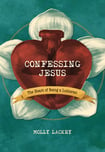“Come, Lord Jesus!” cries the apostle John near the end of the Book of Revelation, the final (and perhaps most widely misunderstood) book of the Bible (Revelation 22:20). And we join him in this cry. Whether at the common table prayer (“Come, Lord Jesus, be our guest”) or in moments of dire anguish and deep distress, we likewise call to heaven, praying that Jesus would return soon. But when will He? And what is Jesus going to do when He does? The following excerpt from Confessing Jesus provides some clarity.
1. We Can Predict the End Days
Especially in America, end-times prophets and predictions have been very popular, especially in the past couple of decades. Part of this comes from a healthy sense of alert watching, which Jesus Himself calls us to do in the parable of the wise and foolish virgins (Matthew 25:1–13). And to be sure, throughout the past two millennia, Christians everywhere have wondered if they were living in the end times, from the apostle Paul to the Protestant reformers to us today. We see the hurt, injustice, warfare, sickness, and death that is gripping this world, the godlessness of our society, the depravity of our culture, and we long for relief. This hope in Christ’s return is good for the Christian to feel.
However, a lot of the end-times “prophets” have also been driven by a radically incorrect reading of Scripture. Lutherans have a unique way of understanding the end times and last judgment, focusing always on Jesus and His merciful work for us. This way of understanding the end of days, a topic that can be frightening to think about, brings a great deal of peace to an otherwise confusing and even scary topic.
Even though misunderstandings about the end times and Jesus’ return may seem unimportant when compared to the big issues facing the Church and the culture, many of the teachings popular among other church bodies actually obscure the reality of Jesus’ love and sacrifice for us. So, even while we talk about the end of time, let us always do so “looking to Jesus, the founder and perfecter of our faith” (Hebrews 12:2).
We don’t know when Jesus is coming back. Jesus Himself said that only the Father knows (Matthew 24:36; Mark 13:32)! So if Jesus didn’t even know, then we’re not going to figure it out either. It’s worth pointing out that nowhere does the Bible say that we can predict the second coming of Christ. While Jesus does give us the short-term prophecy about the destruction of the temple in Jerusalem, that is the only one of these prophecies that is tied to a single, specific, historical event.
2. Secret Rapture
Maybe you have heard someone talk about a “secret rapture,” which is the belief that God will spirit away all the Christians from the world before He returns, leaving all the non-Christians to wonder why their friends, neighbors, and loved ones have vanished into thin air. This teaching is drawn from a confusing and unclear text in Matthew:
“For as in those days before the flood they were eating and drinking, marrying and giving in marriage, until the day when Noah entered the ark, and they were unaware until the flood came and swept them all away, so will be the coming of the Son of Man. Then two men will be in the field; one will be taken and one left. Two women will be grinding at the mill; one will be taken and one left" (Matthew 24:38–41).
This text is a bit confusing. It is not abundantly clear from this text alone which is which: is the Christian the one taken or the one left behind? There are two ways to understand this unclear text through clear ones. For starters, we can reread the account of the flood in the Book of Genesis. Jesus is comparing the end times to the flood, so what happened in the flood?
In the flood, who was taken and who was left? Noah’s family— the righteous remnant—were actually the ones who remained. God protected and sustained them through the ark, while those who had rejected God were taken away by the waters of the flood.
Additionally, we have other parts of Scripture that refute the idea that God will carry out any aspect of the end times sneakily. Consider this passage: “Then will appear in heaven the sign of the Son of Man, and then all the tribes of the earth will mourn, and they will see the Son of Man coming on the clouds of heaven with power and great glory. And He will send out His angels with a loud trumpet call, and they will gather His elect from the four winds, from one end of heaven to the other” (Matthew 24:30–31).
From this text, it’s pretty clear that God won’t be sneaking anyone away. When Jesus comes back, everybody will know, as He will return with “a loud trumpet call” and “power and great glory.” Nothing secret about that!
So, even though that text about people being taken and left is a bit confusing, and you can even see how someone might get the idea that the “secret rapture” is correct, we should never base a teaching on an unclear text. Instead, we should check that text against clearer texts to make sure that we have got the correct idea.
For this reason, we generally don’t base whole doctrines around something we can find only in the Book of Revelation, for example. Revelation is such a complicated and confusing book, full of poetic language and apocalyptic imagery. It is still the inspired, true, and infallible Word of God, but it’s not the best book to use as the basis for a major teaching.
3. We Have a Part to Play to Help Bring About the End Times
If we look at the prophecies about the end times, the categories of Law and Gospel can help us avoid stumbling into error by trying to discern what we need to do to bring about the end times. Simply put, we can’t do anything to bring about Jesus’ second coming.
The Bible’s word on the end times is actually Gospel, not Law. Some people act as though we have to do something, usually some intervention into world affairs or other specific action, to bring about Jesus’ return. But the Bible’s description of the glorious reign of Christ is not something that we have to do or bring about. It’s a promise that Jesus will return to raise the dead and save the faithful, and also that He is already reigning through His Church.
We cannot predict the coming of Jesus by studying current events. The Bible’s prophecies about the end times don’t correlate with our current political or military situations. Jesus Himself says, “But concerning that day and hour no one knows, not even the angels of heaven, nor the Son, but the Father only” (Matthew 24:36; see also Mark 13:32). If Jesus didn’t know, we’re not going to know ahead of time either. We should still be watchful, though, waiting in patient anticipation for the return of Christ. Because even if we don’t know when Christ’s return will be, we know that it will be good news for the children of God.
4. The Second Coming Is Scary
We don’t know when Jesus will return, but we do know that He will return and what will happen when He returns: He will return to judge both the living and the dead. The message of Christ’s return is good news for us because it’s a proclamation that Jesus, God-for-us, is returning to save us from death and the devil.
Even though the second coming seems scary, it’s actually good news for Christians. Most people don’t look forward to the end of the world—after all, it reminds us that we are mortal, that we will die. Unless Jesus returns first, we all will one day die.
Even though the second coming seems scary, it’s actually good news for Christians. Most people don’t look forward to the end of the world—after all, it reminds us that we are mortal, that we will die. Unless Jesus returns first, we all will one day die.
More likely than not, you have experienced the death of a friend or family member. Even the death of a pet, an animal on the roadside, or a fictional character depicted in a book or film can affect us in a deeply emotional way. Make no mistake: death is horrible, absolutely and utterly bad. Any attempt by the culture to call death a “part of life” or “natural,” though perhaps well-intentioned in some cases, is woefully misguided. Death was never a part of God’s plan for His creation. Death is so awful because it is, quite literally, a curse. Death is the curse we fell into for rebelling against God (Genesis 3).
As Christians, we own up to the horribleness of death—but we also know that it’s not the end. We are promised that, if we do die before Jesus returns, He will comfort us after death (see Luke 16:25; Revelation 7:16–17). And we don’t need to fear the second coming because we don’t need to fear what comes after that—the last judgment.
As Christians, we own up to the horribleness of death—but we also know that it’s not the end. We are promised that, if we do die before Jesus returns, He will comfort us after death (see Luke 16:25; Revelation 7:16–17). And we don’t need to fear the second coming because we don’t need to fear what comes after that—the last judgment.
Scripture: ESV®.
Excerpt adapted from Confessing Jesus © 2022 Molly Lackey, published by CPH, all rights reserved.
 Understand what is at the heart of the Lutheran view of Jesus in this book by author and historian Molly Lackey.
Understand what is at the heart of the Lutheran view of Jesus in this book by author and historian Molly Lackey.











